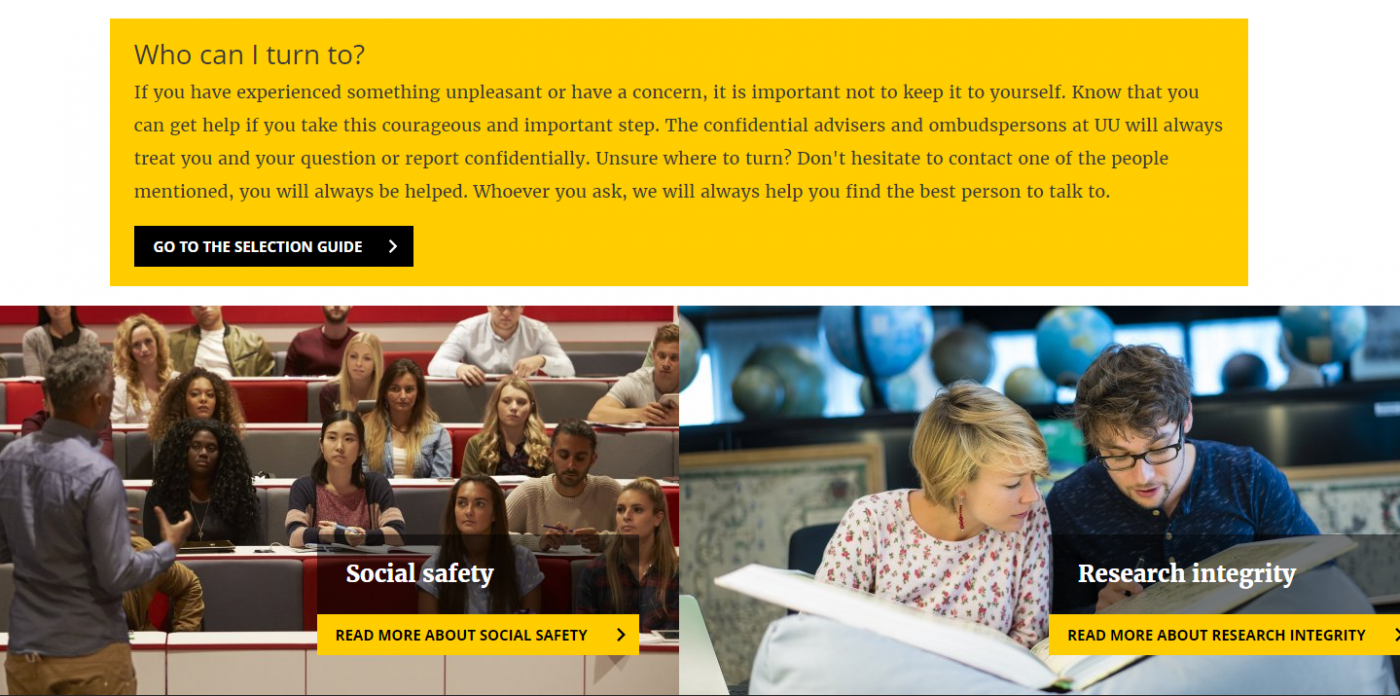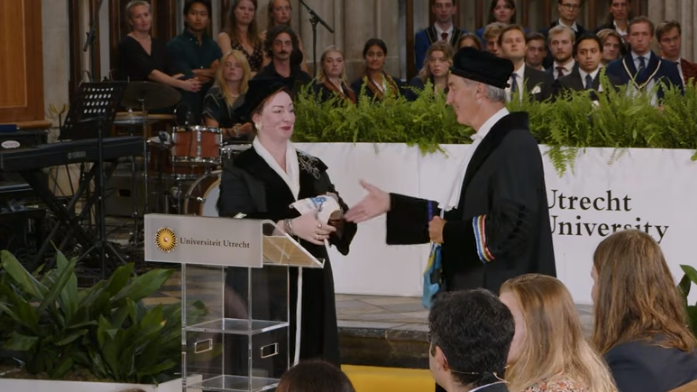Harassment and inappropriate behaviour
Lots of points of contact in UU's new approach to social safety

Suppose your thesis supervisor tries to seduce you or other students make fun of your cultural background or a teacher asks you to expound upon your experiences as a non-binary person at every single lecture. If you're an employee, suppose a professor insists on being the first author of your research or your manager rules the department with an iron fist or a colleague makes sexually suggestive remarks before touching you inappropriately at a work outing. If you're a teacher, suppose you get hateful remarks from students on their evaluation forms.
These are but a few of the many examples of inappropriate behaviours that can take place at a university. UU has just drawn up a new policy with the aim to clarify which roles are attributed to whom when it comes to inappropriate behaviours and violations of its code of conduct. It also specifies who students and employees can turn to when victimised. The document distinguishes between social, scientific and organisational integrity, establishing a code of conduct for each one of them. Moreover, the number of counsellors and ombudspersons dealing with each integrity type is set to increase.
Code of conduct
When it comes to violations of a social nature, the Code of Conduct for the Prevention and Countering of Violations of Interpersonal Integrity (PDF document in Dutch only, Ed) specifies six types of infringements: intimidation, sexual intimidation, discrimination, aggression & violence, and bullying.
In her speech at the ceremony marking the start of the current academic year, Psychology Professor Naomi Ellemers stated that the university should have an atmosphere that allows people to call out inappropriate behaviours. “We should dare to start uncomfortable conversations and tell people that they crossed the line and made us feel unsafe.”
The new document says the most ideal scenario would be when someone talks to the person in question, to the department, or to the education representative about their discomfort. That is easier said than done, however. In a recent meeting of the University Council, members stressed that students and employees are often afraid to speak up because that implies antagonising people in positions of power. It is also common for victims to feel vulnerable or not find the right words to express themselves. Some of them also fear that the person they're complaining about will turn out to be protected by their peers or the university.
For all these reasons, talking to the person concerned is simply not an option for many of those who had an unpleasant or horrible experience. That's why they should also have access to a trustworthy person to whom they can confide.
No one-stop shop
When the University Council discussed a new complaints procedure with the Executive Board, in May 2021, ambitions were high. The goal was to come up with a proposal to professionalise the procedure before the summer of that year. At the time, Rector Henk Kummeling said he aimed to establish a "one-stop shop" where students and employees victimised by inappropriate behaviours could go to.
The process of devising a new procedure ended up taking a year longer than expected and its final iteration does not include a one-stop shop. There are several places where you can go to file the same kind of complaint. For instance, if you want to talk to someone about harassment or bullying, you can choose between a dedicated counsellor and the Interpersonal Integrity Committee. According to the new procedure, dedicated counsellors will be instated at the faculty level as well in the near future.
Scientific and organisational integrity
If the problem lies within the realm of scientific integrity, one could go to a faculty counsellor dedicated to scientific integrity or the Scientific Integrity Committee.
Cases that pertain to work, yearly evaluation conversations between bosses and employees, or conflicts in the workplace can be presented to an employee counsellor (also known as the employee ombudsperson). The process of hiring a specific ombudsperson for students is still ongoing. Once this person is available, the idea is that students will be able to turn to them when they have issues related to education, such as conflicts about grading, when they are not able to solve them through the regular complaints procedure.
Hierarchical ladder
According to the new document, the system is not supposed to be a "hierarchical ladder", meaning that victims are not obliged to turn to the point of contact in their faculty first and then take it to higher instances, step by step. If they want, they can file their complaint directly with the ombudsman or the committee. However, the university once again stresses that the best way to start things is by addressing issues with the person whose behaviour is deemed inappropriate.
In addition, the new rules say that "the structure must offer a clear delineation of tasks, responsibilities and working methods." So, it doesn't matter where a victim goes to file their complaint. If they go to the "wrong" place, they will be sent to the correct one. In theory, that's a good service, but that is not what the UU Council had in mind in 2021. After all, students and staff members still have to choose among lots of possible points of contact.

Screenshot of UU's page about social safety
Selection guide
According to the university, the significant number of counsellors is not going to be an issue. “If you’re having problems of this nature, you can first see whether you can resolve it within your programme or department. If that's not possible or if you don’t feel safe doing so, then UU's website has a selection guide to help you decide where to go", summarises Maarten Post, spokesperson for the university. "If it's about inappropriate behaviour, for example, the website will point you towards the counsellor for inappropriate behaviour, who will help you figure out ways to deal with your report.”
The new procedures stress that the counsellor is on the notifier’s side. The counsellor will help the notifier figure out the best way to handle the situation in which boundaries were crossed. It is not possible to file a formal complaint via the counsellor, though.
Marian Joseph, Assistant Professor at the Faculty of Law, serves as a university counsellor. She says that once somebody notifies her of something, she tries to schedule an appointment with them within a few days. “The notifier can then share their experience and, together, we can evaluate the possibilities. Sometimes, the notifier is already satisfied by having the opportunity to tell their story. Others want to take further steps, which could be a conversation with all parties involved, writing an e-mail to the ones involved together, organising a conversation with somebody from the education programme or service, referring to the ombudsman if the issue is more related to employment, and so forth. As a counsellor, I can help the notifier with all these options, and even be present in the conversation. I can also help them write a formal complaint. But, in practice, that doesn't happen very often."
A formal complaint
For those who do want to file a formal complaint, the file is sent to the Interpersonal Integrity Committee. If the complaint is deemed admissible, then the committee advises the Executive Board about its validity. The committee is chaired by Jellienke Stamhuis, a lawyer who has a lot of expertise in this area and has no other ties to UU, and comprised of three other external members, two UU students and three UU employees.
Jellienke Stamhuis: “We want to be accessible and approachable for students and employees. We don't want to be the last step of the ladder anymore and only be involved if an employee or student sees no other solution than the submission of a formal complaint. Instead, we would like to play a part in the preceding events so we can have sufficient insight into inappropriate behaviours. In doing so, we realise our responsibility to contribute to a safer social climate at UU. In practice, this means that students and employees can come to the committee to notify them about inappropriate behaviour without immediately submitting a formal complaint."
“If the victim prefers, they can file an anonymous complaint. The committee sees complaints only as a signal, they are not enough to start an official investigation. We keep the notification for five years and if there are more notifications about the same person, department or programme within that time, we may raise the issue with the Executive Board, which can decide to investigate the case."
"If one does want to submit a formal complaint, then we will be the ones to start the investigation, as long as the complaint is found to be admissible. That means that the notifier and the person that is being complained about will both be heard and that the latter gets the opportunity to submit a written response to the complaint. As a committee, we advise the Executive Board about the validity of the complaint.”
There's been quite a lot of discussions at the University council about whether the university should allow for an anonymised way to file formal complaints. There is still no way to do this in the new policy. “As a committee, we have urged them to consider this because it is important that employees and students can notify us anonymously. That would contribute to the accessibility. If there are several notifications, we can pass them on”, Renate Bosman, Master’s student in Social Policy & Public Health and one of the members of the new Interpersonal Integrity Committee.

Naomi Ellemers gives UU President Anton Pijpers a bag with points of concern in the ceremony to start the academic year
No ideal situation
Naomi Ellemers started her speech by remarking that submitting a formal complaint often leads to disappointment as it may lead to judicial procedures, insecurity for the colleagues (who wonder what happened), and an outcome that often doesn’t do justice to the situation. Stamhuis acknowledges all this can happen but she thinks that the pursuit of a complaint can be a positive thing in itself. “In an ideal situation, we wouldn’t need any procedures because we would be able to talk about anything. But that isn’t how things go in practice, unfortunately. By making a notification or submitting a complaint, a student or employee can feel that they're being heard and taken seriously, and that the issue will have consequences. A possible result may be that we write up more general advice to improve social security in the university as a whole. Such advice can come from the cases we’ve read. Complaining is therefore definitely a worthwhile endeavour.”
Marian Joseph also thinks Ellemers remark was too negative. “When someone goes to see a counsellor, we can try to discuss the issue. It is good for people to be able to tell their stories. Sometimes, we can find a solution, such as appointing a different thesis supervisor or promotor. At other times, the cases are so severe that a formal complaint is necessary. It is useful for counsellors to offer the right support in these processes.”
Sanctions
The kinds of sanctions that might result from a formal complaint are still a controversial topic. Another point of controversy is whether notifiers or people submitting a formal complaint will experience any adverse consequences as a result of their actions. Stamhuis: “It is the responsibility of the Executive Board to make decisions based on our advice and define what the consequences will be.”
Stamhuis stresses the importance of the protection against adverse consequences, a part of the new policy: “In the new system it is written that UU has to extend every effort to protect people who make a notification or submit a complaint in good faith and that no adverse consequences (for instance to their career prospects or academic progress) or retribution will be tolerated. If someone still feels as though that is happening, it is important to notify the committee, and they will act upon it.”
Naomi Ellemers stressed the importance of building a culture of social safety at the university. Stamhuis and Joseph agree with that, but they stress the importance of having a co-existing policy in place if that culture fails. The university also says to be working on improving its social climate. Last year, the play Mindlab sought to start conversations about scientific integrity and inappropriate behaviour among the employee and student communities. There are plans to make a new play about inappropriate behavior in the classroom, especially for students. The idea is to collaborate with the Utrecht University of Applied Sciences. The show is expected to premiere next year.
Where can you find the counsellors?
The members of the University Council questioned how easy it is to find information about inappropriate behaviour when you search for it on the website dedicated to students, the Intranet or UU's website. Indeed, it is not easily accessible. On the student homepage, one should go to "Practical information" and then to "Policies and Procedures". There, visitors can click on "Complaints, objections and appeals" to find information on the topic. Another option is to click on "Guidance and development" and then read the "Who to contact" subheading.
Employees can find this information a little bit easier on the Intranet. By clicking on "Organization", you can find a page about social safety through both "Directly to" and "Safety". On UU's website, you should click on "About us" and then go to "Governance and organisation", through which you can go to "Talk in confidence, report or file a complaint."
Therefore, people seeking this information have some searching to do. In the council meeting, the Executive Board responded by recommending that people type "Inappropriate behaviour" on the search bar. However, this search term leads to a different result on the student page compared to UU's website. The latter is an overview, in which the content under "Selection Guide" is particularly informative. On the student page, this is slightly more hidden from view at the top right of the page. On both websites, you can go to the page "Talking to someone about inappropriate behaviour", which contains an overview and pictures of the people you can turn to file a notification or complaint.
In the council meeting, members said that the execution of the code and policy will start a conversation about how information about inappropriate behaviour can be made as visible and findable on the website as possible. The university has also said that they will evaluate the updated communication on the website with end users.